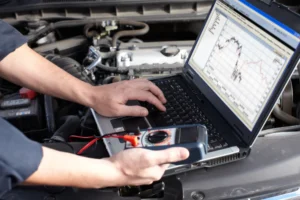Text messages, call logs, and phone records have become some of the most powerful tools in the government’s arsenal, often providing the timeline and connections needed to secure convictions in complex human smuggling charges and drug trafficking cases.
Prosecutors use phone and text records to:
- Show communication patterns between co-conspirators
- Track movements across borders
- Outline the structure of smuggling operations
- Analyze call frequency and timing to prove coordination
- Review texts for coded or explicit illegal activity
- Use cell tower data to place defendants at crime scenes
- Map networks and identify unknown participants through contact lists and call histories
- Expose payment structures and profit distribution via financial messages
If you’re facing federal smuggling charges in which phone or text records are being used as evidence, the stakes couldn’t be higher. Call Javier Guzman at (956) 516-7198 today for a confidential consultation about your case.
Show communication patterns between co-conspirators
If you’re facing charges, prosecutors will examine your phone records to suggest you were coordinating with others, even if your communications were innocent. They look for patterns like frequent calls during certain time periods, group messages, or contact with specific individuals to establish conspiracy in drug or human smuggling charges in Texas.
What you might consider normal communication with friends, family, or business associates can be twisted to suggest criminal coordination. In first time alien smuggling cases, defendants are often shocked to learn that routine conversations have been reinterpreted as evidence of planning illegal activities.
Track movements across borders
Your phone’s location data creates a trail that prosecutors will use against you, potentially showing you were near the border or in areas they claim are smuggling routes. Even if you had legitimate reasons for being in these locations — work, visiting family, or personal business — this evidence can be presented to make your movements appear suspicious. Cell tower pings can place you in general areas, but this technology isn’t always precise, and there may be valid reasons to challenge the accuracy and interpretation of this location evidence.
Outline the structure of smuggling operations
Prosecutors will analyze who you call and how often to try to paint you as part of an organized smuggling network. Your normal social and business contacts might be characterized as co-conspirators, and the frequency of your communications could be presented as evidence of your role in an alleged operation. They may claim that calling certain people makes you a leader, coordinator, or participant in smuggling activities, even when these relationships are completely legitimate.
Analyze call frequency and timing to prove coordination
The timing of your calls and messages will be scrutinized to suggest coordination in smuggling activities. Prosecutors might claim that calling someone at a specific time proves you were coordinating illegal activity, when in reality, you might have been making routine personal or business calls. An experienced attorney for human smuggling charges in Texas can challenge these interpretations by providing context for your communication patterns and demonstrating innocent explanations for the timing of your calls.
Review texts for coded or explicit illegal activity
How text messages are used as evidence in court can be devastating to your case if prosecutors successfully argue that your innocent messages contain hidden meanings. They will search your texts for any language they can claim refers to smuggling activities, often interpreting ordinary words as “code.”
Terms like “package,” “delivery,” or “pickup” in your messages might be presented as evidence of human trafficking, even if you were discussing legitimate deliveries or business matters. The interpretation of these messages is often subjective and can be successfully challenged.
Use cell tower data to place defendants at crime scenes
Cell tower data showing your phone’s general location will be used to place you at alleged crime scenes, even if the data isn’t precise enough to prove exactly where you were. Being in the general vicinity of border areas or locations where smuggling allegedly occurred can be presented as evidence against you, regardless of your legitimate reasons for being there. This technology has limitations in accuracy that your defense attorney can challenge, especially regarding the precise timing and location claims.
Map networks and identify unknown participants through contact lists and call histories
Your contact list and call history will be examined to identify everyone in your network, potentially exposing friends, family, and business associates to investigation. People you’ve never suspected of wrongdoing might be labeled as participants in an alleged smuggling operation simply because they’re in your phone or you’ve communicated with them. The penalty for hiring illegal immigrants can even affect individuals who had minimal contact with you, making it crucial that you understand how your phone records might impact others in your life.
Expose payment structures and profit distribution via financial messages
Any messages discussing money, payments, or financial transactions can be used to argue that you profited from smuggling activities. Text messages about legitimate business transactions, personal loans, or even splitting dinner bills might be presented as evidence of payment for smuggling services. This type of evidence is particularly concerning in cases involving harboring a fugitive in Texas, where showing any financial benefit can lead to enhanced charges. Even innocent financial discussions in your messages can be twisted to suggest commercial smuggling operations and criminal intent.
Digital evidence in smuggling cases — FAQs
What is an example of digital evidence?
Digital evidence includes text messages, call logs, location data from cell towers, contact lists, and social media communications that prosecutors use to build their case. In smuggling of persons cases, this evidence might show communication patterns between alleged co-conspirators, location tracking near borders, or financial messages that prosecutors claim prove commercial smuggling operations.
Can you delete texts before a subpoena?
While it’s not illegal to delete texts from your phone during normal use, deliberately destroying evidence after you know about a criminal investigation or anticipate legal proceedings can result in obstruction of justice charges. Once you’re aware of an investigation, preserve all digital communications and consult with an attorney immediately.
Can deleted text messages be subpoenaed?
Yes, deleted text messages can often be recovered and subpoenaed from cell phone carriers, cloud backups, or through forensic examination of your device. Phone companies typically retain text message records for varying periods, and law enforcement can obtain these records through court orders even if you’ve deleted them from your phone.
Don’t let your phone records write your defense story. Call Guzman Law Firm today!
Federal prosecutors are building their case against you using every text message, call log, and location ping from your phone, but Javier Guzman has spent years mastering the art of dismantling digital evidence in federal smuggling cases.
Javier’s reputation in Laredo’s federal courts is built on aggressive defense strategies and intimate knowledge of how smuggling cases are prosecuted and defended. He knows that every text message matters, every call log has context, and every piece of digital evidence can be challenged — when you have the right attorney by your side.
Don’t trust your future to anyone else when federal prosecutors are using your phone against you. Contact Javier Guzman at (956) 516-7198 or contact us online for the experienced, dedicated defense your case demands.
More Helpful Articles by Guzman Law Firm:
- When Smuggling Becomes Trafficking
- The Role of Driver Fatigue in Laredo Truck Accidents
- How to Get a Federal Drug Conspiracy Case Dismissed
- What To Do if You’re Caught in a Border Sting Operation
- What Is Unwitting Possession in Smuggling Cases?





